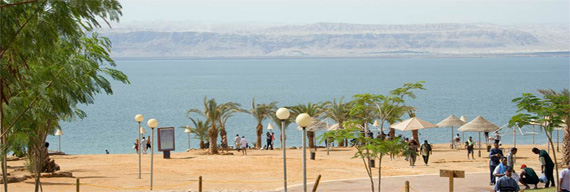The
Israeli side of the Dead Sea is a possible day trip from Jerusalem
(39km from Northern Dead Sea), Eilat (220km from Southern Dead Sea),
or, at a stretch Tel Aviv
(98km from Northern Dead Sea). There are three main road entry routes
into the Dead Sea area. The first is via Highway 1 and Highway 90,
through the West Bank, from the Jerusalem area. Alternatively, you
could access the area from Eilat via Highway 90 from the south, or from
the road from Beersheva via Arad.
Visit the Ein Gedi National Park, the biggest and the most important
oasis in Israel. The park is found in the Dead Sea Valley, which is an
effect of the Great Rift Valley.
In the park there are two sprung-fed rivers that streams for the all
year: the David Stream and the Arugot Stream, and two more springs the
Shulamit and Ein Gedi springs, also flow in the reserve.
Ein Gedi Kibbutz
is a kibbutz located few dozens of meters southern than the park. In
the kibbutz there is a beautiful botanic garden with more than 900
species from the entire world. The garden, that
covers about 100 dunam, is the only botanic garden in the world with a
settlement. Ein Gedi is
a real oasis with lush vegetation, nestled between two streams, amidst
the arid landscape. Today, fresh spring water from Ein Gedi is bottled
here. The Ein Gedi Nature Reserve
is on Route 90 (Dead Sea road) about 1 kilometer north of Kibbutz Ein
Gedi and it is open April-September:
8:00-17:00, October-March: 8:00-16:00. Visitors
have access to the adjacent nature reserve for viewing bird sanctuaries
and wildlife of the desert, including the Nubian ibex. Hikers have the
choice of following two riverbeds and can follow trails past
waterfalls, springs, caves, canyons and an early Bronze Age temple.
Visit Mount Sodom,
the region's only salt desert, and home to the biblical towns of Sodom
and Gommorah, afford breathtaking scenery within a couple of miles of
the Dead Sea.
The Negev and
Judean
deserts are also within close radius of the Dead Sea with amazing
desert landscapes. Perhaps some must-see landscapes are the three
craters including the Ramon Crater.
Visit Masada - Mountaintop
Fortress and Massada
National Park. Massada National Par is 18 km south of Ein Gedi, or 12 km from Ein
Bokek to the cable train on the east (Dead Sea). Masada
is a mountaintop fortress which King Herod transformed in 35 BC into a
3 tiered winter home. The site
is a UNESCO World Heritage Site. It is
easily accessible via a quick cable car ride or
by hiking up the serpentine path. It is open 7
days a week. First cable car - 8am. October to March - 4pm, April to
September - 5pm. Located
only 18 km north of the Ein
Bokek hotel area.
Visit Qumran, one of the leading
centers for tourism in the West Bank. Qumran is known as the site where
the Dead Sea Scrolls were discovered. While the scrolls themselves are
now displayed in Jerusalem's Israel Museum, the cave complex is open to
visitors.
NOTE:
Camping is allowed for free on the Ein-Gedi coast (aprox. 500m south of
the Kibbutz itself), toilets and showers are on site for a little fee.
The ground is a bit stony so any kind of mattress is useful.
Related Links:
 Dead
Sea Dead
Sea
 Dead
Sea From Jordan Side Dead
Sea From Jordan Side
 Asia
Parks Asia
Parks
 Travel
Asia Travel
Asia
|
|
Caution:
During winter and spring there is a danger of floods on rainy days. The
Dead Sea basin receives rainwater from relatively far-off areas like
the Jerusalem Mountains. This means that sometimes during a sunny day a
flood will suddenly and unexpectedly occur. Therefore, be careful when
hiking to distant narrow places during these seasons and stay tuned to
the weather news.
Warnings:
The weather forecast always gives warnings if there is a possibility of
flooding. Always
do as national reserves staff order - they know the terrain very well.
In 2007, several Israelis who had been "snappling" (rappelling) were
killed by a flood because they did not obey national reserve staff
orders.
Beware:
Several people drown every year in the Dead Sea because they do
not obey the rule: Only float on your back. Accidents happens when
someone tries to swim normally (stomach first) in the water - the legs
will float better than usual and the head will be submerged. Also, the
salt in the water stings cuts and causes great pain if it comes in
contact with the eyes, adding to the panic if one's head is under water.
Note:
For walk on the beach always wear waterproof sandals. The salt is very
jagged and can easily cut your feet.
Languages:
On the Israeli part of the Sea, Hebrew and English are the most widely
spoken languages. All resort and tourism staff will be able to speak
both. On the Jordanian side, both Arabic and English are spoken.
|
 |













